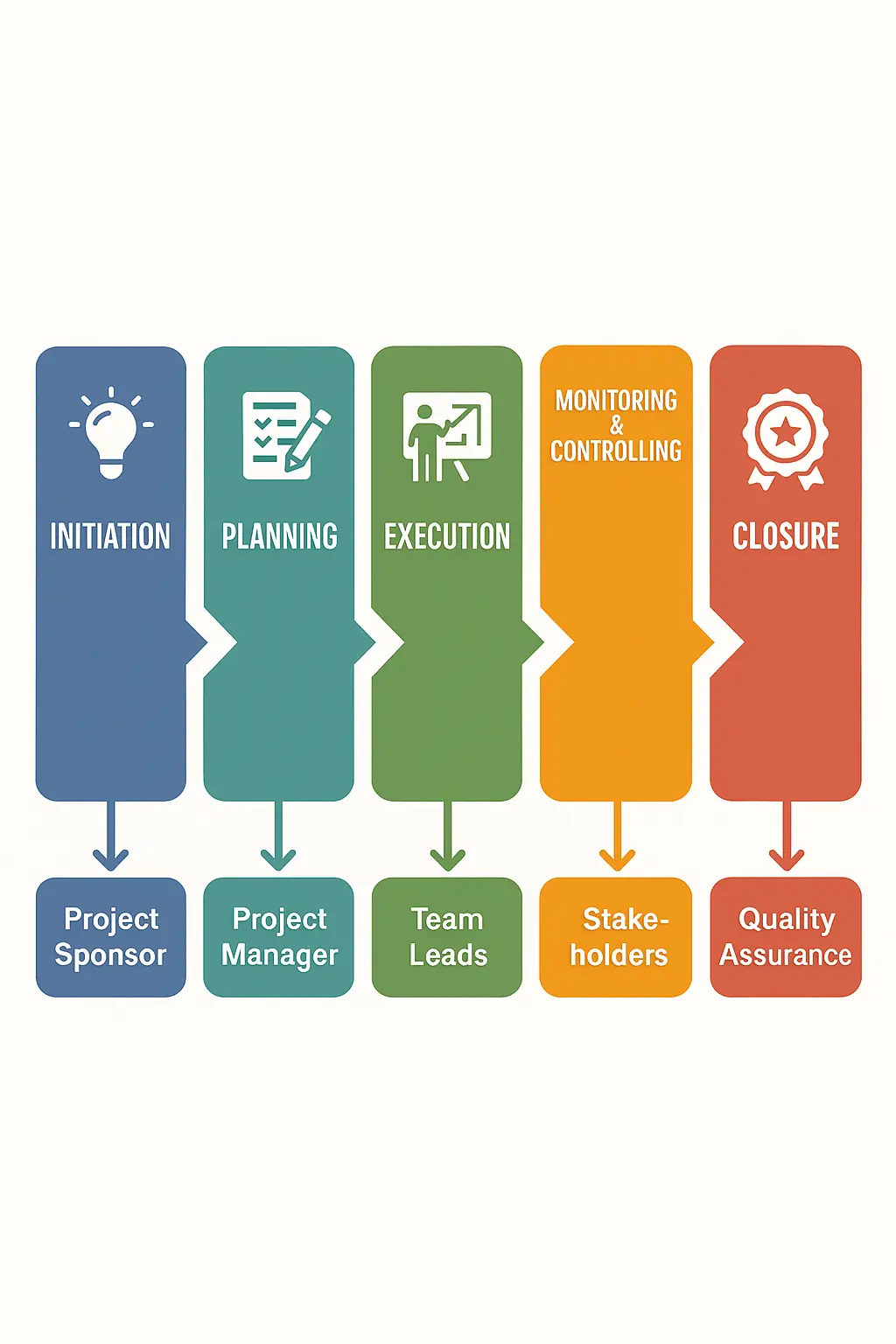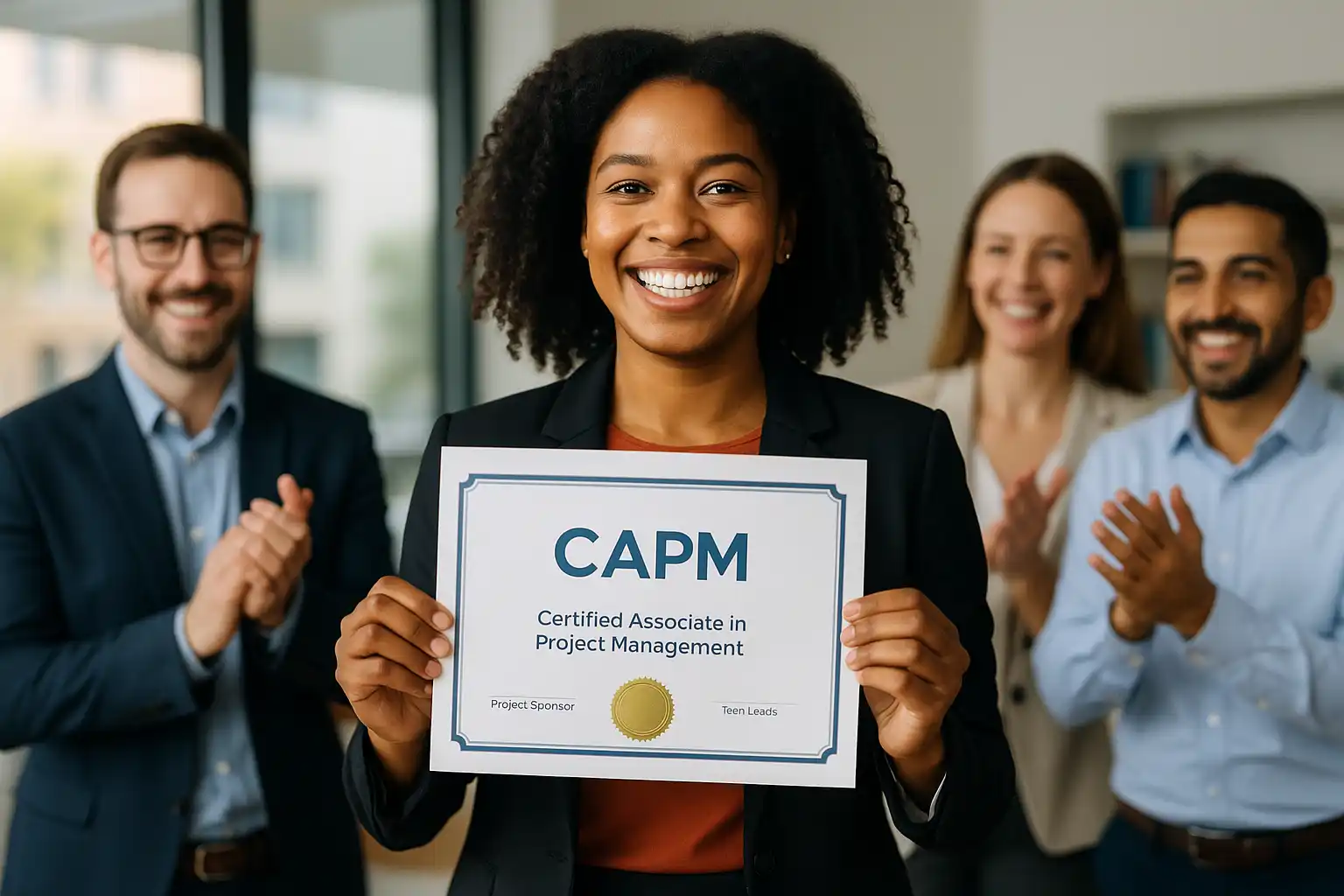How to Network for Success During Your CAPM® Certification Training Course
By Ryan Cezar Malaluan, CAPM®; Editor: Geram Lompon; Reviewed by: Alvin Villanueva, PMP®
Starting your
While in your
Key Takeaways
- Networking is essential during your CAPM certification training.
- It provides opportunities to connect with peers and industry professionals.
- Staying updated on industry trends is key for career success.
- Building a professional network can enhance your career prospects.
- A strong network can lead to new opportunities in
project management .
Introduction to Project Management and Career Pathways

What is Project Management ?
Project management is the discipline of applying knowledge, skills, and techniques to guide a project from start to finish. According to the
Project managers ensure that projects are completed successfully and meet all requirements and quality standards. By mastering
The Project Management Institute PMI sets the global standard for
The Role of the Associate in Project Management
The
This entry-level certification demonstrates your understanding of
CAPM-certified professionals gain foundational knowledge and skills essential for managing projects effectively and are recognized by employers as capable contributors to project teams. The CAPM credential is a valuable stepping stone for anyone looking to build a successful project management career.
Entry-Level Project Management Jobs
Entry-level
These positions typically involve supporting experienced project managers with planning, scheduling, and tracking project progress. You usually need a high school diploma, secondary degree, or general educational development (GED) certificate to qualify for entry-level
Completing a
The Value of Professional Connections in Project Management
The CAPM certification is more than learning
Why Networking Is Essential for Project Management Career Growth
Networking is key in
This learning helps you gain a better understanding of
How Connections Help with CAPM Exam Preparation
Connections made during CAPM training can aid in exam preparation. Discussing with others and experts provides you with different perspectives on
- Discussing case studies with peers can enhance your understanding of
project management principles. - Receiving guidance from experienced professionals can help you focus on key areas tested in the CAPM exam.
- Collaborating to review key topics and knowledge areas covered in the CAPM exam ensures comprehensive preparation.
- Participating in study groups can keep you motivated and on track with your study plan.
Study groups can also help break down complex concepts for better understanding.
Setting Strategic Networking Goals
To maximize the benefits of networking in CAPM training, establish clear goals. After identifying your objectives, you can create a personalized networking plan to maximize the benefits of your CAPM training. Think about what you want from your connections. Do you want a mentor, to learn new methods, or find a job?
Knowing what you want helps you build meaningful relationships. These relationships are key to growing in
Preparing Your Networking Strategy for CAPM Certification Training Course
Your CAPM certification training is a great chance to make connections that can boost your career. Networking should be integral to your overall CAPM preparation strategy, helping you access valuable study resources, share effective learning strategies, and stay motivated throughout your exam readiness journey. A well-defined networking strategy is crucial for discovering new opportunities and gaining insights from experts in the field.
Researching Instructors and Industry Professionals
Start by researching the instructors and professionals you’ll meet during your training. Look at their backgrounds, expertise, and notable projects they’ve worked on. This will help you have more meaningful conversations.
- Review their professional profiles on platforms like LinkedIn.
- Check if they have any articles, blogs, or books published.
- Identify any common interests or experiences that could serve as conversation starters.
Crafting Your Project Management Elevator Pitch
An elevator pitch is a summary of your professional background and goals. It’s essential to make a good impression during your training. Your pitch should highlight your career aspirations and why you’re interested in
To make a great elevator pitch, remember:
- Start with a strong opening that grabs attention.
- Highlight your relevant experience and skills.
- Clearly state your career goals and how the CAPM certification aligns with them.
- Practice your pitch until it feels natural.
Developing Your Digital Professional Presence
In today’s digital world, having a professional online presence is essential. Make sure your digital profiles, like LinkedIn, show your growing skills in
To improve your digital presence:
- Use a professional profile picture and header image.
- Clearly state your professional brand and career aspirations.
- Engage with relevant content and contribute to discussions.
- Share your experiences and insights related to
project management .
In-Person Networking Techniques During Training
Starting your CAPM certification journey? In-person networking during training can significantly enhance your career prospects. It allows you to meet others who share your interests, learn from their stories, and form connections that can benefit your career.
Making Memorable First Impressions
First impressions matter at in-person training. Dress well, be ready, and smile. Introduce yourself, discuss your
- Be confident and enthusiastic when introducing yourself.
- Show genuine interest in others and their
project management experiences. - Be prepared to discuss your career goals and how CAPM certification aligns with your aspirations.
Maximizing Group Projects and Team Activities
Group projects and team activities are key in CAPM training. They let you work together, share ideas, and learn essential skills. Be active, share your thoughts, and listen to feedback to get the most out of them.
Working well in teams helps you build strong bonds with your peers. You’ll learn from their experiences, better understand
Engaging with Instructors and Guest Speakers
Instructors and guest speakers offer valuable insights into
- Research the instructor’s or guest speaker’s background and areas of expertise.
- Prepare thoughtful questions that demonstrate your interest in
project management . - Take notes and follow up with the instructor or guest speaker to continue the conversation.
Talking with instructors and guest speakers deepens your understanding of
Virtual Networking in Online CAPM Certification Training Course
Virtual networking in CAPM online courses can boost your
Maximizing Digital Tools
Using digital tools well is key in online CAPM training. Here’s how:
- Engage in live chats and forums.
- Join webinars and virtual workshops.
- Use tools for group projects.
- Access course materials anytime and from any device through digital platforms
Creating Virtual Study Groups
Setting up study groups and virtual teams is important. You can:
- Share the CAPM study material.
- Work on projects together.
- Build a support network for your CAPM journey
Standing Out Virtually
To shine in virtual classrooms, be proactive and engaging. Try these tips:
- Join online discussions and share your views.
- Ask insightful questions in live sessions.
- Use video calls to connect with instructors and peers
Using these tips, you can network well in your online CAPM course. This could lead to great connections and career chances. Knowing the CAPM certification cost and being in a training program can also motivate you to network more.
Building Long-Term Professional Relationships After Training
Your CAPM certification is more than a piece of paper. It’s a key to a strong professional network that helps your career grow. It’s important to keep in touch with people you met during your training to find new opportunities.
Following Up with Strategic Connections
It’s key to stay in touch with the people you met after getting your CAPM certification. Reach out to your instructors, classmates, and industry pros. A good start is a personalized LinkedIn request or email, mentioning your shared training experiences.
To keep these connections strong, try:
- Sharing
project management news or articles. - Commenting on their posts and updates.
- Meeting up to talk about industry trends or get advice.
Joining Project Management Professional Groups
Being part of
Being in these groups can help you:
- Keep up with the latest in
project management . - Join in discussions that match your interests and skills.
- Go to conferences and workshops to learn from experts.
Leveraging Your Network for Job Opportunities
Your network can be a big help when you’re looking for a job. Use the connections you’ve made and the groups you’re in to find out about job openings that aren’t advertised everywhere.
To make the most of your network, focus on:
- Telling your network about your career goals and job search.
- Asking for advice and referrals.
- Using LinkedIn to show off your skills and experience.
Keeping a strong professional network after your CAPM training can improve your job prospects and stay ahead in the job market.

Wrapping Up
As you complete your CAPM certification training course, remember that networking is key. It’s vital for your growth in
Starting a
Good
This will help you reach your career goals in
Keywords: Agile

